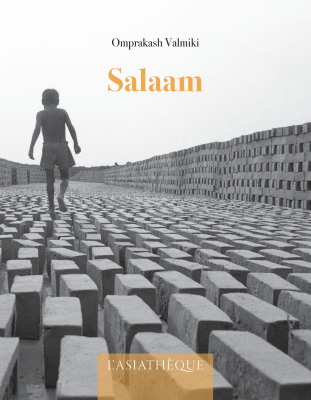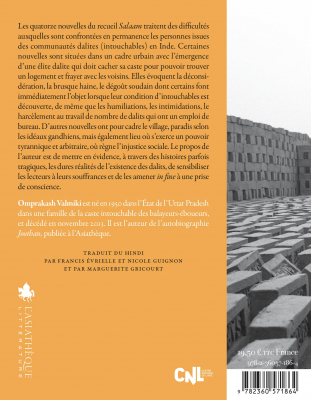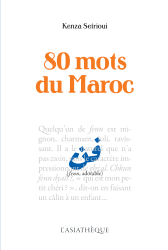Details
Format: Paperback
ISBN: 9782360571864
Collection: Monde indien
14 x 18 cm
Weight: 300 gr
Pages: 274
First publication: 03/10/2018
Last printing: 09/2018
The hard hitting work of an outcast from India. A universal literature of the voiceless people.
The collection of short stories Salaam (« Allégeance »), translated from Hindi and published in India in 2000, offers 14 short stories dealing with the issues constantly faced by the population of the lower castes, also referred to as the dalite community. Some of the short stories take place in an urban surroudings with the emergence of an dalite "elite" who must hide the caste they come from in order to find an housing and manage to mix with the neigboors. However, as soon as their statut of untouchables is revealed, they become subject of denigration and sudden spurge of hate and aversion from the neigboors. This change of behaviour toward dalits also occures at work, especially for those working as office workers, as humilation, act of intimidations and harassement at work become common practices once they are seen as part of the dalite community. Other short stories take place in village, considered as a heavenly place according to the ideals of Gandhi. Yet, for the untouchables, villages are hellish places where arbitay and tiranic power prevails along with social injustice, feodalism, capitalism and Brahmanism, which characterised somehow the hindouist system. The author expresses himself in his short stories in the third person and often resorts to dialogue. The descriptions are both concise and meticulously detailled. The facts speak for themselves and awaken readers to the harsh reality of the Dalite community, making them aware of their suffering and ultimately bringing them to a state of consciousness that makes possible a social change that can restore the dignity of those who have been deprived of it for centuries.
PRESS REVIEW
“... The sentences are short, dynamic and each short story could be the subject of a short film. »
Indian literature: "Untouchable" and proud of it
"... Several of the accounts touch on the subject of Dalits who have perfectly normal relations with their high caste neighbors as long as the latter ignore their social background, and the total rejection which follows the revelation ..."
Salaam
“... The author addresses in particular the system of quotas set up by the government to counter this unequal caste system. These positive discriminatory measures have unfortunately only been able to benefit a minority which, in addition, faces reprisals ... ... "
Salaam
"... The Asiathèque publishes there an exciting collection, for well written and translated, which allows us to define Indian society more closely. The author goes to the most direct, even if sometimes, he borrows the paths of the descriptions of places, customs, smells, his language is direct and clear ... "
Omprakash Valmiki, Dalit writer
"... The collection of short stories emphasizes the difficulties facing the caste of the Untouchables in town or in the countryside ..."
CONTRIBUTORS' BIOGRAPHIES
Omprakash Valmiki
Omprakash Valmiki, was born in 1950 in the state of Uttar Pradesh in a family of the untouchable caste of sweepers-garbage collectors, and died prematurely in November 2013. He has asserted himself since the 1990s as one of the authors most important Hindi-speaking Dalits of his generation. Author engaged in social, political and economic fields for the emancipation of the oppressed, regularly published in various literary magazines as well as in academic journals, he has written poetry, short stories and essays. He also wrote a history of the valmiki community (name adopted by members of the garbage collection community in the years 1920-1930). He is the author of the autobiography Joothan, published in the Asian Library with this book.
Marguerite Gricourt
Marguerite Gricourt is a lecturer at the Institute of Oriental Languages and Civilizations. A specialist in Hindi / Urdu, she is also the designer of the Hindi / Urdu baccalaureate subjects.
TABLE OF CONTENTS
Présentation de l’auteur et de l’ouvrage (Presentation of the author and the book)
Salaam (Salaam)
Le rêve (The dream)
La peau du boeuf (The beef's skin)
Panique (Panic)
Où pourrait bien aller Satish ? (Where could be Satish going to ?)
Le meurtre d’une vache (The murder of a cow)
L’éclipse (The eclipse)
La femme de Biram (Biram's wife)
Vingt-cinq fois quatre, cent cinquante (Twenty-five times four, one-hundrerd-fifty)
Tempête (Storm)
La bête sauvage (The wild beast)
La machination (The plot)
Amma (Amma)
Nomades (Nomads)
Glossaire (Glossary)
















